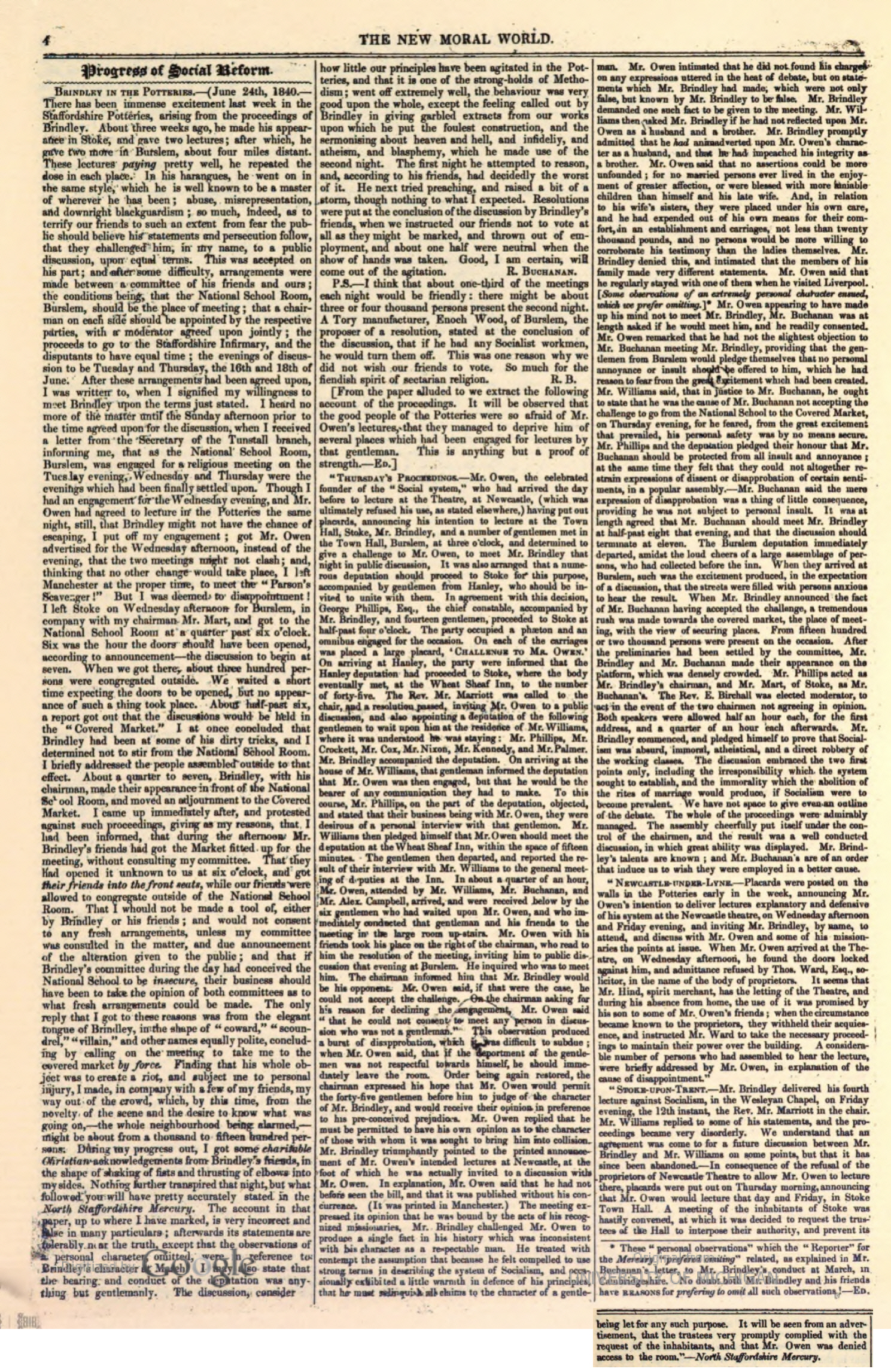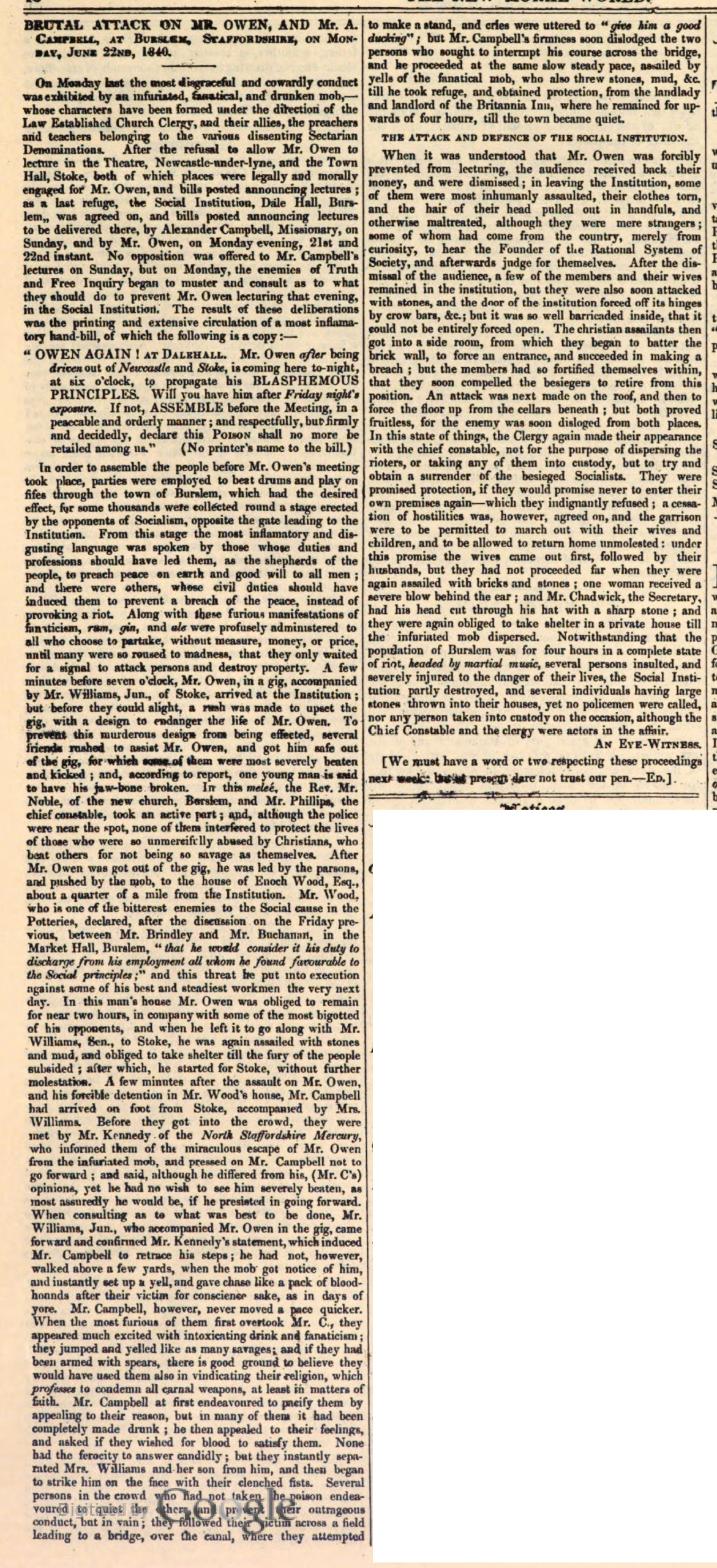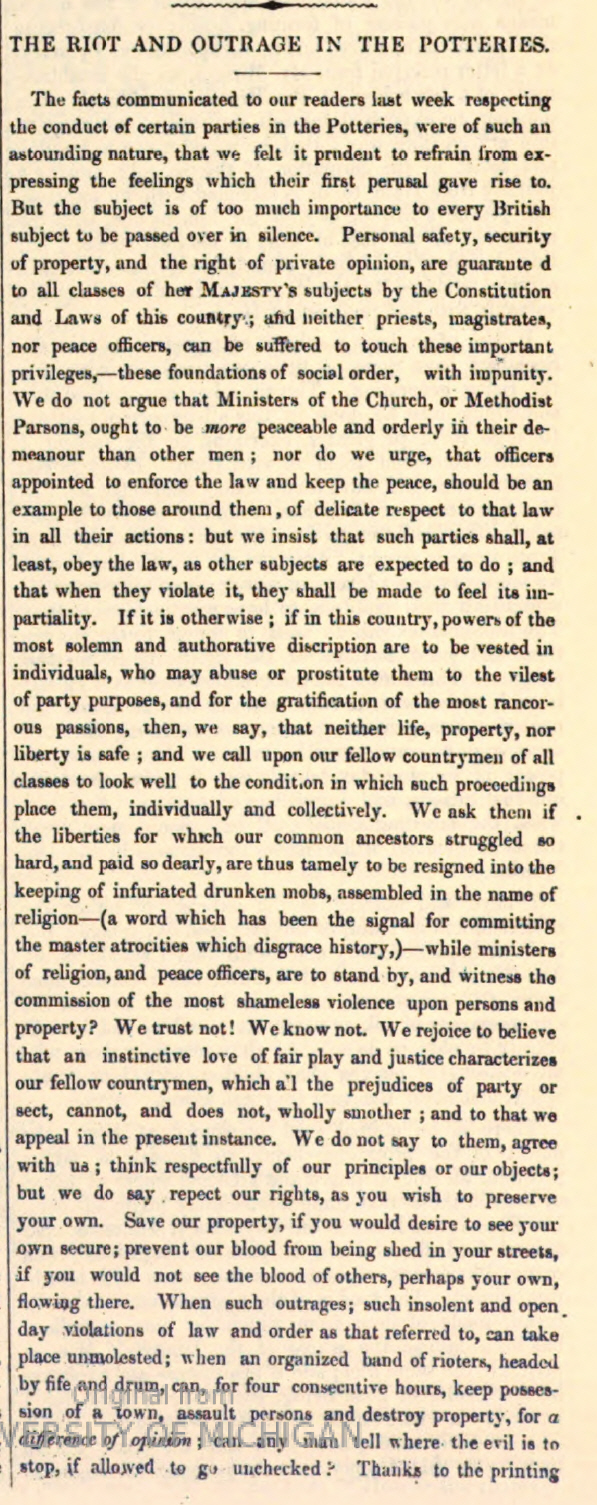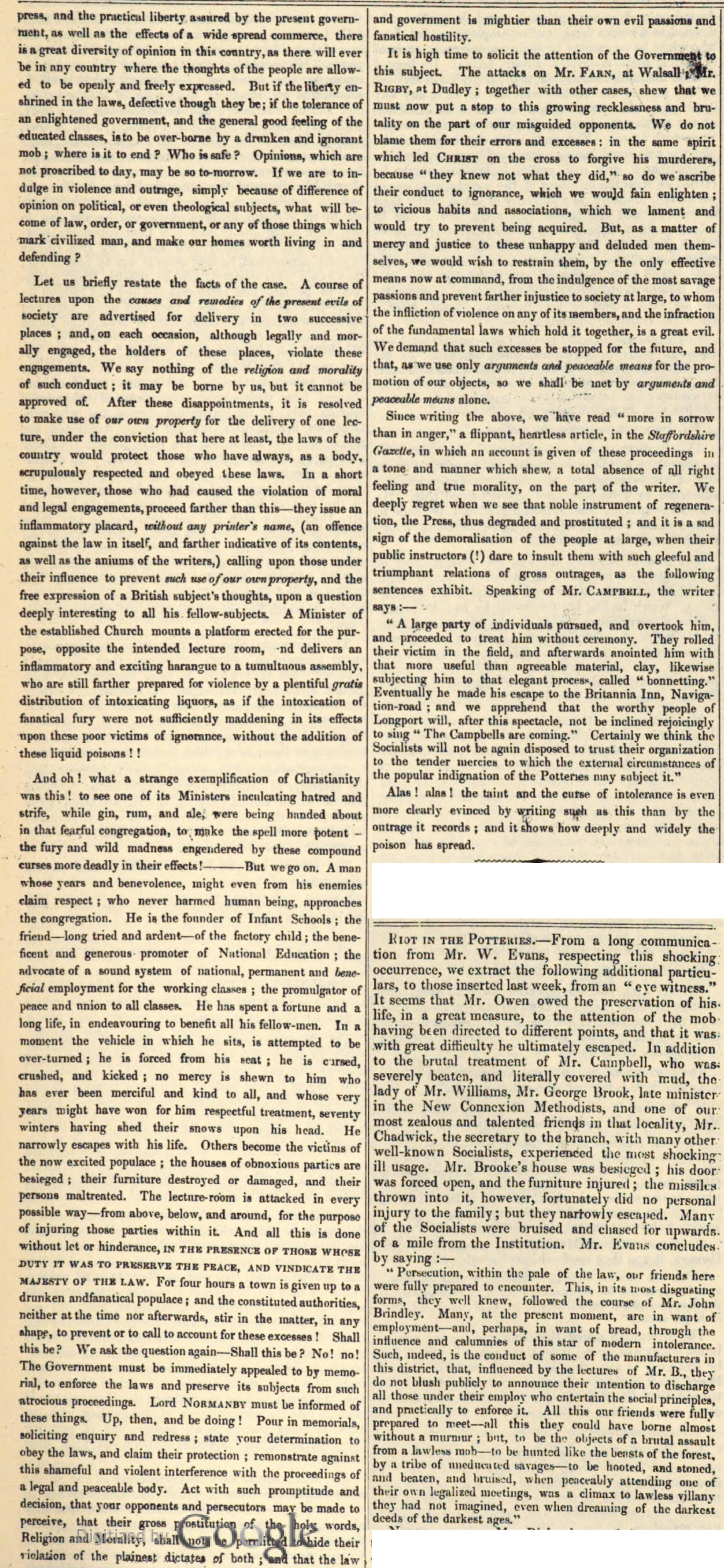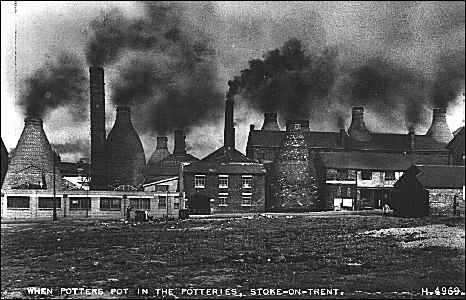|
There is another account of the events of 22nd June, 1840 in Lloyd Jones’ The Life, Times and Labours of Robert Owen (London: Swan Sonnenschein and Co., 1890) - available at the Internet Archive. The following is taken from Volume II, Chapter XI: ‘Riots at Burslem and Bristol’, pp.119-124:
CHAPTER XI.
Riots at Burslem and Bristol.
THE crusade against Robert Owen and the Socialists was, at certain places, becoming dangerously active, in consequence of the anger excited by those for whom the Bishop of Exeter was acting in the House of Lords. The people generally, even though they could not be regarded as encouraging the agitation, did not actively oppose it. Nor did the Government oppose it. The proceedings of the Socialists were carried on within doors, they made no offensive public demonstrations, nor did they do anything to arouse public anger. Still, during the years from 1838 to 1842, an opposition was organised for the purpose of hunting down, by public clamour, persons, who in the promulgation of their principles, refused to be intimidated by men incited to activity by ignorance and prejudice. Mr. Brindley was the principal instrument in this work, and whether to his credit or discredit, it is right to say that no one could have laboured with more zeal. It was he who instructed the Bishop of Exeter. What the bishop uttered in the House of Lords gave the cue to the press, and between him and the newspapers, most extraordinary conceptions of Robert Owen and his plans took possession of the minds of large numbers of people, 120 who became warm in their antagonism, without taking much trouble to ascertain whether or not they were justified in what they were doing.
Mr. Brindley went up and down the kingdom, and wherever he went, by placards and meetings, he managed to inflame the minds of the violent, the bigoted, and the ignorant. In the June of 1840, he visited the Staffordshire Potteries. The patronage of some few of the bishops, and a considerable number of the clergy of the Established Church, together with an adverse address by the Wesleyan Congress to the people of that denomination, caused many of the employers to give open support to Mr. Brindley, not only by subscribing to defray the expense of his efforts, but by dismissing from their employment persons known to be friends and adherents of Owen. Mr. Brindley’s success in the Potteries was very considerable; public buildings were engaged for him, in which he delivered exciting addresses, and the tickets of admission to such meetings were bought by the employers, and distributed among the people who worked for them. Arrangements were made for a discussion in the National Schoolroom at Burslem, between Mr. Brindley and Mr. Robert Buchanan, but without consulting Mr. Buchanan, Mr. Brindley and his supporters changed the place of meeting to the covered market, and took the precaution to have it well filled with their friends before the other side was aware. In fact, so violent and unscrupulous were their proceedings, and so great the number of people who suffered through being thrown out of employment, that it was considered best to act quietly, though firmly, until the worst of the storm 121 had blown over. The years 1838 and 1839 were years of great depression in trade, during which the working people suffered much, whilst 1840 was a year of slow recovery, and as the pressure of bad times, on the workers was becoming gradually relieved by increase of employment, it was decided not to do anything that could be avoided through which suffering might be brought on struggling men who were at the mercy of those disposed to act at the instigation of Mr. Brindley and his friends. During this time arrangements had been made for a course of lectures to be delivered by Robert Owen, at different towns, and the principal public halls were engaged. In each case the agreement was violated, and the halls refused. In addition to this, the following placard, without signature or printer’s name, was extensively posted. “Owen again! at Dalehall. Mr. Owen, after being driven out of Newcastle and Stoke, is coming here to-night, at six o’clock, to propagate his blasphemous principles. Will you have him after Friday night’s exposure? If not, assemble before the meeting, in a peaceable and orderly manner, and respectfully, but firmly and decidedly, declare that this poison shall no more be retailed among you.” That this peaceful and orderly assembly might not be deficient in the element needed, drums and fifes were sent through the town in various directions, and a crowd of several thousands of the roughest portion of the inhabitants was collected, while a platform was erected for the purpose of holding an opposition meeting exactly opposite the institution where the meeting of Robert Owen was about to take place. The playing of music and 122 the processions through the town led to much drinking, the liquors being, for the most part, supplied free of cost Addresses of a most violent kind were delivered from the platform, and everything was in a state of preparation. Mr. Owen arrived a few minutes before seven o’clock, in a gig, accompanied by a young friend from Stoke; but before he could alight, an effort was made to upset the gig, for the purpose of inflicting personal injury. To prevent this, his friends went to his assistance—he was at this time seventy years of age—and got him safely out of the gig, though several were savagely beaten while doing so—one young man having his jaw bone broken. The police, being, no doubt, previously instructed, looked calmly on. The mob, being overwhelming, forced Mr. Owen through the streets to the house of a man who was one of his most active enemies, where he had to remain for two hours the object of gross insult. At the end of this time Mr. Williams, a friendly solicitor, arrived to take him home with him, but the moment Owen appeared he was assailed with stones and mud, from which he had to again take shelter. After a time, however, he got safely off to the neighbouring town where he was staying.
Mr. Alexander Campbell, the social missionary who attended Mr. Owen, not knowing what had become of him, was making his way through the mob in search of him, but found that he had got off. Mrs. Williams, the wife of the solicitor above referred to, was with Mr. Campbell anxiously looking for Owen, who was her guest. As soon as they discovered that he had escaped they began making their way back, but Mr. Campbell was recognised. He was at once separated 123 from the lady who accompanied him, and severely beaten. In his efforts to escape, he had to pass over a field and a canal bridge, and here an attempt was made to throw him into the canal; he escaped, however, and took refuge in a house where he had to remain for several hours.
The persons who had assembled in the hall to hear the address fared no better. The account published at the time says that when it became known that Mr. Owen was forcibly prevented from lecturing, the audience was dismissed; but on leaving the institution they were most inhumanly treated, their clothes being torn, and, in some instances, the hair pulled from their heads. Those who organized the meeting remained behind, and were at once besieged. An attempt was made to force the door, which had been strongly barricaded. This failing, a room adjoining the lecture hall was taken possession of, and a breach made in the party wall. Here a fierce battle ensued, the attacking party being driven back. A double attempt to enter was then made—one from the cellars, and another from the roof of the building. A clergyman and the head constable then put in an appearance, and tried to obtain a surrender, offering a free and save passage if the parties promised not to assemble again in their own hall. This offer was refused, and after some further parley it was agreed that they should be allowed to return home unmolested. It was then arranged that several women who were there, the wives of some of the party, should leave first, on the supposition that no attack would be made on women. The men, not being sure of this, followed close behind, and their suspicions were well founded. 124 One woman received a severe blow on the head, while the secretary of the institution had his head badly cut through his hat by a stone. They again took shelter in a private house, and here they had to remain till late into the night when the mob dispersed. No attempt was made to check these proceedings, and bands of music were allowed by the police to parade the town for the purpose of keeping up the excitement till late at night, and, although several persons were severely wounded, nobody was arrested. The press took the same approving view as that taken by the authorities. The Staffordshire Gazette, describing the treatment of Mr. Campbell, says:—“A large party of individuals pursued and overtook him, and proceeded to treat him without ceremony. They rolled their victim in the field, and afterwards anointed him with that more useful than agreeable material, clay, likewise subjecting him to that elegant process called ‘bonneting.’ Eventually he made his escape to the Britannia Inn, Navigation Road, and we apprehend that the worthy people of Longport will, after this spectacle, not be inclined rejoicingly to sing ‘The Campbells are Coming.’” Such proceedings as these, however, are not to be considered as fairly exhibiting the spirit of the people towards the Socialists. Nothing approaching to riot or personal violence was indulged in by the people when left to themselves, but only where Mr. Brindley, or some person like him, in league with one or two clergymen of the fanatical sort, set themselves to work to excite them. Besides, this sort of opposition never spread. Where the irritation was provoked it occurred, and as soon as the incentive was withdrawn all became quiet again.
_____
“What the bishop uttered in the House of Lords gave the cue to the press, and between him and the newspapers, most extraordinary conceptions of Robert Owen and his plans took possession of the minds of large numbers of people, who became warm in their antagonism, without taking much trouble to ascertain whether or not they were justified in what they were doing.”
- plus ça change ...
___
How Many Williams Are There?
The attack on Robert Owen and his followers in the Potteries on 22nd June, 1840 has faded from the local memory; unlike the Chartist riots, which occurred two years later in August 1842 and which resulted in the death of one ‘rioter’, Josiah Heapy, while 146 others were sent to prison and 54 were transported to Australia. Before I start singing Bella Ciao, I should drag this section back to the main focus of this site, Robert Williams Buchanan, or at least the starting point of this section, his grandfather, William Williams.
There is some confusion about the Mr. Williams of Stoke-upon-Trent who owned a Manufactory - perhaps it was merely an investment - and the early accounts of ‘Lawyer’ Williams do place him in the town of Stoke-upon-Trent. Later he moves to Adventure Place, off Albion Street, Shelton and has offices in Pall Mall, Shelton - both of which are now in Hanley.
- And here I interject the briefest of histories of Stoke-on-Trent, composed of six towns, running north to south in a rough line from Tunstall, through Burslem, Hanley, Stoke-upon-Trent, Fenton to Longton, united by a common industry which gave the place its collective name, the Potteries. In 1910 the six towns were federated into the county borough of Stoke-on-Trent, then in 1925 it became a city. Between each town there are various districts - for example between Hanley and Stoke-upon-Trent, lies Shelton (among others). I’ll leave it there, merely commiserating with the hapless travellers who land at Stoke Station then face another two mile journey to the City Centre, which is in the town of Hanley. -
William Williams, the solicitor, the husband of Anne and father of Margaret and William - later, the father-in-law of Robert Buchanan and grandfather of Robert Williams Buchanan - was providing accommodation for Robert Owen in his house in Stoke-upon-Trent. It was William Williams Jnr. who accompanied Robert Owen to Burslem, and his father, William Williams Sen. who rescued Robert Owen from the house of Enoch Wood. Meanwhile, Anne Williams had accompanied Alexander Campbell, Social Missionary, to the meeting, and then had witnessed, with her son, the mob’s vicious assault on Mr. Campbell.
William Williams Jnr. appears on the 1841 census return which places him, aged 20, with his sister, Margaret Buchanan (also aged 20, maybe twins, maybe a mistake), their mother, Anne (45) and an 11 year old Charlotte Flemington, in a house in the village of Caverswall. William Jnr.’s occupation is given as ‘Writing Clerk’. His sister, Margaret, had married Robert Buchanan in Manchester on 5th October, 1840, and their son, Robert William Buchanan (he added the ‘s’ later) was born on 18 August, 1841 in Caverswall, which is a small village around 3 miles from Longton, the southernmost of the Six Towns of the Potteries. It is still fairly rural today, so in 1841 it would have been a complete contrast to the smoke-filled hellhole that was the Potteries. If that seems an extreme description, check out the photo.
|
